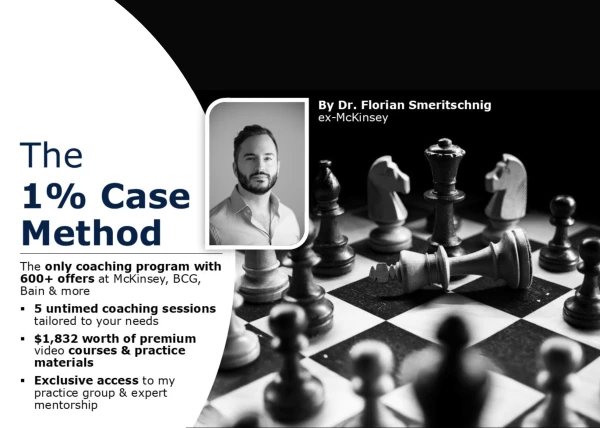Hi, I got an offer from McKinsey Paris and I am 100% convinced to accept. Tho I've heard that excel is a core tool that I will be using. As of now, I've never used it apart from very small stuff in uni projects, I consider myself a total novice. Can this be a problem?
Hi, I got an offer from McKinsey Paris!


Hey there,
Congrats on the achievement!
If you are interested in preparing for your new role, I'd suggest the following:
When I got the offer some years ago I did the same. I reached out to people I knew in McKinsey and people who interviewed me to ask: What can I do to make the start easier? How can I prepare?
The answer from everyone was: Relax! Enjoy your time before you start and don't think about it. You will figure it out on the job. I followed that advice and it made sense to me once I joined.
When you start at in top tier consulting there are 2 ways to learn:
- Formal training. The formal training sessions/ weeks/ days in the beginning, are nice, however, they are more for networking and meeting your peers. You learn some interesting concepts and get some useful tips from more experienced consultants BUT
- Constant and implicit learning on the job is where it's at. No matter if you are a newcomer or a veteran after a few years, you will always find yourself on a steep learning curve. As soon as you barely mastered one skill or the skills needed for one level in the hierarchy, you will take care of things, which are expected from a more senior colleague. This cycle never ends. You are expected to learn on the job, and learn from your colleagues, your mentors, and sometimes even the client. So basically a newly promoted Engagement Manager has the same 'struggle' as a new-hire Business Analyst. They both need to work in a completely new environment and role.
Focusing on Excel here is overkill and not what's important. Excel is extremely easy to learn (especially for the types of tasks it is used for in consulting) but it's best to learn it on the job while working on real problems. You can always ask colleagues, Google, or the help desk while working on specific analyses and encountering problems. If you learn while you encounter problems, you will quickly internalize the skills and after a month you will be fully proficient for the typical needs of an MBB consultant.
The trickier parts that take longer to learn are to understand what types of analyses you need to work on at a specific time, how to design them, and why they move the needle (prioritization and analytical framing), how to collect the required data, etc.
Excel is just execution.
Knowing that, if we now go back to square one in your journey it makes perfect sense to enter the firm with a blank slate with a lot of curiosity and eagerness to soak it all up and quickly learn the ropes.
Nothing matches the experience and the learning and this is a good thing (also the reason why ex-MBBs are valued highly in the job market).
You will learn everything you need to master while doing it. You will be thrown in the cold water and need to swim. However, your colleagues will always be happy to help you and mentor you. And for the rest, you will figure everything out along the way. The key here is always to ask for tips, shortcuts, feedback, etc. Don't be quiet if you get stuck.
Lastly, if you have no domain knowledge about a certain industry or topic, read through the internal library of documentation (which is endless) and call some of the firm experts on the topic. Usually, they are happy to offer you a short call to get you up to speed.
But here’s something extra: Since the question came up ever so often with my clients, I've authored a book titled "Consulting Career Secrets," specifically to guide newcomers like you in navigating this journey. The goal of the book was to answer all typical questions of entry-level consultants and show them the way to make the entry and the transition as simple and painless as possible. While no book or training can entirely prep you for the unique experiences of your first day, week, or project, it offers comprehensive insights to mentally prepare you, suggests essential tools and skills to acquire, shows you the ways how to do that, and strategies to quickly adapt and excel in your new role. You can DM me if you want to know more. You can also find it on Amazon.
In any case, don't sweat the small stuff like Excel, and enjoy the ride!
Florian

Hi there! Huge congrats on your offer! You can (and totally should!) take this as a sign that you have what it takes to be a good consultant!
On that note, (1) yes, excel is a pretty core tool, but (2) being a novice in excel is absolutely no problem. You will learn so much on the job!
The way it typically works on learning on the job is you need to solve a problem in excel so you find ways to solve it. This can be asking around, taking over an old excel model from someone else or very often just googling how to do stuff. MBBs also offer a lot of trainings for the most common tools.
However, if you do have a bit of time before now and when you will start, it for sure can't hurt to increase your proficiency >> there are tons of online resources you can use.
From my personal experience (and preference), the most valuable things have been not doing complicated formulas or macros, but having good principles on how to structure the data (while keeping models simple).
Congrats again on the offer and hope you have a great experience at McKinsey!
Ariadna

Congrats on your offer!
True, Excel is definitely important, but starting with little to no experience won’t be an issue. Most people are in the same boat when they join. You’ll receive training early on and be assigned buddies to guide you. Plus, the close-knit team structure means you’ll always have someone to ask for help.
Honestly, don’t worry about doing any training before you start—use the time to relax and enjoy yourself. You’ll learn everything you need once you’re there!
Wishing you all the best!

Hi
Congrats on the offer! Agree you should be convinced to accept!
I was in the same boat transitioning from a legal career (no excel at all) to consulting.
You will receive academic excel training and have the opportunity to take a few dedicated courses, but most of the training will be 'on the job'. Coming in completely cold in excel is ok but will make your day job harder than it already is (and it's hard).
If you can, try to do 1-2 consulting-specific excel courses (opposed to generic training, youtube tutorials). Every bit of preparatory learning helps to ensure you get off to a great start. I did 1 business modelling course and 1 financial modelling course personally.
Good luck!

Hello there,
Congratulations!!
Short answer to your question is that it would most probably not be a problem considering a good chunk of what you'll use will be learnt on the job.
My advice is that you should take this time to recharge and prepare for the steep learning curve that lies ahead.
If you feel a nacking urge to learn some Excel tips before starting, I'd suggest you pick a course deliberately curated to support future and current consultants. Feel free to reach out for any specific recommendations.
Fathu

Hi,
Congrats on the offer!
Don't worry about not knowing excel. I studied History and started in consulting, and learnt everything I needed to on the job.
All the best!













